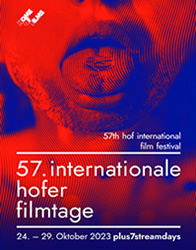The show goes on
He had just recently met with festival colleagues in Munich. Rainer Huebsch was one of them, the long-standing festival organizer on location and second chairman of the Cine-Center. For health reasons, he had to resign from his duties. But then there he was again for the preparations of the 50th Hof International Film Festival. This so very important forum for German film had to go on – that was unanimous. The artistic direction for the anniversary edition was led by a curatorium, consisting of Linda Söffker, head of the Berlinale’s Perspektive Deutsches Kino section, Alfred Holighaus, president of the SPIO, and Thorsten Schaumann, who had worked at Bavaria Film and most recently at Sky Germany, responsible for Licensing, Acquisitions and Marketing. One year later, Schaumann assumed the sole direction of the festival. But first things first, the 50th edition had to be organized.
“The show must go on.”
… said Rainer Huebsch at the opening, quoting Heinz Badewitz who made it habit of saying the same when organizational difficulties arose. The show in October 2016 began very promising with the film THE BLOOM OF YESTERDAY, a romantic comedy on the edge of the abyss, directed by Chris Kraus. There was a small festival retrospective with films by such directors as Vlado Kristl and Maren Ade, but of course new discoveries as always, to which festival veterans like Herzog, who travelled to the festival from the USA on his own costs, and Wenders contributed. Herzog participated in a panel discussion in a new location, the Hoftex hall, a discussion about “looking back to the future.” Highlights in the international program included films by Jim Jarmusch (PATERSON) and Ken Loach (I, DANIEL BLAKE), the Film Prize of the City of Hof went to the young actress Aylin Tezel, and for first time, the festival itself awarded a prize: the Heinz Badewitz Prize, to honor up-and-coming directors. The prize itself is a object from the Design Academy in Selb.
One year later, just in time for the 51st festival edition, this object appears in XXL format. It is 5.8 meters tall and covered with 1,825 LED lights. Every day five more light up, and on the last day of the festival, all of them. Over the whole year, the city reminds its inhabitants and visitors with this light installation of its cultural beacon which now takes off into its second half century. More German films than ever, in total 34 are shown. Hof is to remain the festival for new discoveries, says Badewitz’s successor Schaumann, who also wants to set new accents, with the HoF Plus discussion panels, for example, which concentrate on hot topics within the industry.
The festival kicks off with Jan Zabeil’s THREE PEAKS, further interesting things follow, including films about prominent members of cultural and economic society – PHILIP ROSENTHAL is among them, as are the singers NICO and FAITHFULL. From the USA, there is Guillermo del Toro’s THE SHAPE OF WATER, which won the Golden Lion in Venice; the retrospective was dedicated to Tony Gatlif whose films depict the Roma gypsy and Algerian Kabyle cultures; the Film Prize of the City of Hof honored the documentary filmmaker Wolfgang Ettlich.
A few weeks later, at the annual general meeting of the Cine-Center, over which Ana Radica now chairs in Badewitz’s place, everyone is happy that the festival’s high-standards were held up. And Thorsten Schaumann says:
“Among the film festivals in Germany, we want to be and remain the Number 2 behind the Berlinale.”


